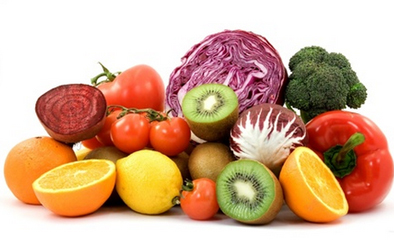| |
|
| Eat well, Live well |
| |
 |
| |
Awareness, prevention, and early detection can keep you healthy! Your nutritional needs will vary depending upon your health and fitness goals. If your aim is to lose body fat and body weight, you need to become familiar with the variables that affect weight loss and body fat loss. Above all, you should realize that it 's more important to lose body fat than to lose overall body weight.
Losing body fat reduces your risk for coronary artery disease, while losig overall body weight doesn't neccessarily reduce this risk. In other words, you shouldn't just cut your calorie intake. Instead you should reduce your intake of fatty foods and increase your physical avtivity level.
Water
Water is the most essential nutrient the body needs.
Forty to sixty percent of your body weight is water. Muscle composition is approximately 70% water. When you exercise, your body loses water through perspiration (dehydration). It is important that you continuously drink water while you are exercising and continue drinking throughout the day.
Eight to ten glasses ( 8 fluid ounces) of water are recommended daily for the average person.
Vitamins and Minerals
Vitamins and minerals are essential and are found in the natural foods that we consume in our daily diet (fruits, vegetables, meats and whole grains).
Vitamins are organic compounds (natural and contain carbon) which provide energy to the body and are needed in small amounts to assist with chemical reaction within the cells. Vitamins come in two forms: fat soluble and water soluble.
Fat soluble Vitamins (A,D,E,K) are stored in the adipose tissue (fat tissue) and can build up high levels of toxins in the body if they are not utilized.
Water Soluble Vitamins (B,C) are excreted if your daily amount of intake is too great and can be toxic in the body if they are not utilized.
Minerals are inorganic substances (unnatural and man made) and they regulate processes within the body. Minerals are incorporated into different structures within the body to create enzymes, hormones, skeletal bones, skeletal tissues, teeth and fluids.
Calcium and phosphorus are two most common minerals found in the body. Some of the other prevalent minerals found in the body are: iron, zinc, sodium, potassium, magnesium, fluoride, sulfur, copper, and chloride.
Calories
A calorie, or kilocalorie (Kcal), is a measure of heat energy. Food calories are nutrients and supply energy to the body.
It is essential that you take in the recommended amount of calories per day. The caloric intake level that's appropriate for you depends on a number of factors, including your height, weight and gender.
There are three types of calories: Carbohydrates, Fats, Proteins. The American Heart Association and RDA recommends a daily total food diet that consists of the following caloric breakdown: 50% carbohydrate, 30% fat, 20% protein. For individuals who are exercising on a consistent basis, it is recommend that a daily total foods diet consist of the following caloric breakdown: 65% carbohydrate, 10% fat, -25% protein. The higher level of carbohydrate (65 percent) supplies a greater level of energy to the muscular system. The lower fat level (10 percent) decreases your risk for coronary artery disease.
Carbohydrates
Carbohydrates are converted into sugars. Your level of carbohydrate intake will depend upon your desired health and fitness goals.
Carbohydrates come in two forms:
1.- Simple sugars: Simple sugars are used almost immediately during exercice. Examples of simple sugars, are processed sugar and fruit sugar.
2.- Complex sugars: Complex sugars, also called complex carbohydrates, supply energy to the muscles during exercice. Muscles store large amounts of glucose or glycogen that supply energy to the muscles during prolonged exercise. Examples if complex sugars are breads, cereals, grains, pasta, rice, fiber, potatoes, vegetables and fruits.
Fats
Hight fat intake can lead to obesity, heart disease, heart attacks, and strokes. The lower your level of fat intake, the lower your risk of developing coronary artery disease.
However, fat has positive attributes, too. The body must maintain a certain level of body fat to insulate its inner systems, and to help process vitamins and minerals. Like carbohydrates, fat also fuels the body during exercise. Your level of fat intake should depend upon your health and fitness goals. Examples of foods that are high in fat are cheese, nuts, avocados, cooking oils, and ice cream. It's a good idea to restrict your consumption of these types of foods.
Protein
A protein is composed of amino acids, which help to build muscle mass.
The higher your level of muscle mass, the more efficient your basal metabolic rate. An efficient basal metabolic rate, in turn, increases fat and calorie expenditure ast a resting state. Our level of protein intake depends upon your desired health and fitness goals.
Some foods that are high in protein include egg whites, chicken (white meat), lean beef (red meat), beans, and skim milk. |
|
|
| |
|
|